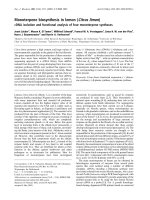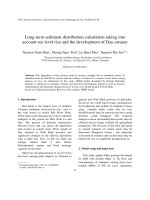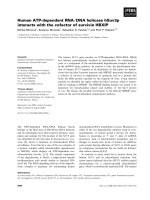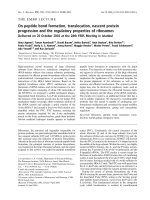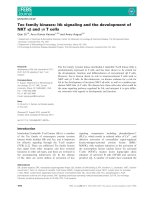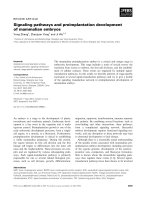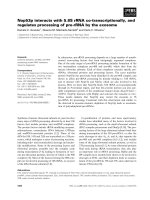Báo cáo " Long-term sediment distribution calculation taking into account sea level rise and the development of Day estuary " potx
Bạn đang xem bản rút gọn của tài liệu. Xem và tải ngay bản đầy đủ của tài liệu tại đây (733.79 KB, 6 trang )
VNU Journal of Science, Natural Sciences and Technology 28, No. 3S (2012) 57-62
57
Long-term sediment distribution calculation taking into
account sea level rise and the development of Day estuary
Nguyen Xuan Hien
1
, Duong Ngoc Tien
1
, Le Quoc Huy
1
, Nguyen Tho Sao
2,
*
1
Vietnam Institute of Meteorology, Hydrology and Environment
2
VNU University of Science, 334 Nguyen Trai, Hanoi, Vietnam
Received 15 July 2012
Abstract. The deposition in Day estuary tends to increase strongly due to abundant sources of
sediment from the Red River system and the estuary is located in a concave coast where strong
impacts of wave are eliminated. In this study, MIKE model developed by Danish Hydraulic
Institute is employed to simulate, evaluate and forecast hydrodynamic regime as well as erosion,
sedimentation and shoreline change processes in Day river mouth located in Ninh Binh.
Keywords: Sediment transport, Red river, Day estuary, MIKE model.
1. Introduction
Red River is the largest river of northern
Vietnam. Sediment conveyed by this river is
the vital source to enrich Red River Delta.
Three main rivers that play key role in sediment
transport in the system are Red, Ninh Co and
Day. The process of dynamic interactions
between rivers and sea causes the deposition
and erosion in coastal areas. River mouth of
Day situated in Ninh Binh province has
significant changes in the alluvial deposition
with a rapid rate. This, on the one hand can
enlarge natural land, it also affects
hydrodynamic regime and flood drainage
capacity on the other.
Moreover, the phenomenon of sea level rise
has been causing great impacts on Vietnam in
_______
Corresponding author. Tel: 84-4-38584945.
E-mail:
general and Ninh Binh province in particular.
Sea level rise could lead to huge consequences
for livelihoods and welfare of residents in these
areas, valuable lands could also be lost.
Shellfish pools may be removed and the coastal
fisheries could disappear. The temporal
mangrove areas surrounding these pools may be
affected and no longer suitable for agricultural
production. The diversity of the flora and fauna
in coastal estuaries of coastal areas may be
decreased. Mangrove forests – the important
ecosystem in estuaries and coastal areas may be
reduced in size or completely disappeared, etc.
2. Model setup and input data
This study applies Mike package developed
by DHI with module Mike 11 for flow and
concentration of sediment coming from river,
module MIKE 21 SW for wave simulation,
N.X. Hien et al. / VNU Journal of Science, Natural Sciences and Technology 28, No. 3S (2012) 57-62
58
MIKE 21 HD for hydraulic simulation and
MIKE 21 ST for sediment transport.
Topographical data for model MIKE 21 is
obtained from nautical maps with scales
ranging from 1:10,000 to 1:1,000,000 by
Vietnam Navy. Domain stretches from 19
o
46'N
to 20
o
21'N in latitude and 105
o
56'E to 106
o
45'E
in longitute. Maps with large scale are used for
coastal areas and islands, while small scale
maps are used for offshore areas. In this study
the finite element mesh from the sea to the
shore is shown in Fig. 1b. Smallest area of an
element is 1250m
2
in region of river estuaries
such as Day, Ninh Co and BaLat, the largest
area is 25km
2
in offshore region. The domain
includes 2879 nodes with the coarse resolution
of 5000m for offshore and the fine resolution of
50m for nearshore areas.
Figure 1. a) Bathymetry of the study area, b) Mesh used.
Flows from river calculated by MIKE 11
model are used as river mouth boundaries. This
study applies 3 models namely MIKE 21 SW,
FM MIKE 21 HD, MIKE 21 ST [1] for
simulations. At first, MIKE 21 SW model is
used for wave spectrum calculation, then the
outputs from wave model are used as input data
for the remaining two models.
Inputs for MIKE 21 SW model include:
wave height, wave period and wave direction
for the offshore boundaries. Sea levels obtained
from harmonic analysis are used as boundary
conditions for MIKE 21 HD model. Boundary
condition for the model MIKE 21 ST is the
sediment concentration balance.
Meteorological field is taken from
meteorological records at VanLy station in the
"Handbook of continental hydro-meteorological
features of Vietnam" [2]. Grain size (d
50
=
0.17mm) and sediment concentration are
derived from the data measured at Day estuary
in 2 surveys (July and November, 2009), and
from previous studies on geology and
geomorphology of this area in [3, 4].
3. Model calibration
3.1. One dimensional model MIKE 11
MIKE 11 model which has been using for
operational forecast of Red - Thai Binh river
system is used to simulate the flow and
sediment concentration at the hydrological
stations near river mouths such as Ba Lat, Nhu
Tan and Phu Le. Because observed sediment
data in Red river and Ninh Co river are not
available, only sediment concentration data
N.X. Hien et al. / VNU Journal of Science, Natural Sciences and Technology 28, No. 3S (2012) 57-62
59
measured at hydrological station NhuTan (on
Day river) from 1/11/2009 to 30/11/2009 are
used for model calibration. Results show good
agreement between simulated and observed
sediment concentration in terms of phase and
magnitude.
g/l
0
0.04
0.08
0.12
0.16
0.2
1/11/2009 0:00 6/11/2009 0:00 11/11/2009 0:00 16-11-2009 00:00:00 21-11-2009 00:00:00 26-11-2009 00:00:00
Time
Caculation Observation
Figure 2. Sediment concentration at NhuTan station
on Day river.
3.2. Two dimensional model MIKE 21 FM
The model is calibrated with measured
water levels at Day river mouth. These data
were obtained during the 7-days survey under
the project "Research on prediction methods for
riverine tidal boundary" conducted by Center
for Marine and Ocean-Atmosphere Interaction
Research (from 19-VIII to 26-VIII-2010).
-1.5
-1
-0.5
0
0.5
1
1.5
8/19/1 0 8/21/1 0 8/23/10 8/25/10
Time
m
Caculation Observation
Figure 3. Observed and calculated water levels at
Day estuary (106
0
12’7.14”E, 20
0
1’26.49”N).
m
-1.5
-1
-0.5
0
0.5
1
1.5
9/1/2010 9/11/2010 9/21/2010 10/1/2010
Time
Calculation
Obtained from harmonic analysis
Figure 4. Calculated water levels and water levels
obtained from harmonic analysis at Day estuary
(106
0
35’E, 20
0
13’N).
The model is validated against water levels
obtained from harmonic analysis (from 1-IX to
1-X-2010) at three nearshore locations. Fig. 4
show the results at testing locations KN (near
Day estuary). It can be seen that there is a good
agreement between calculated by model with
water levels obtained by harmonic tidal
prediction: coincidence of phase and amplitude
(correlation coefficient is 0.88). The results can
be now used as input to MIKE 21 ST model for
simulating sediment transport.
4. Sea level rise scenarios for Day estuary area
Greenhouse gases emission scenarios are
selected for calculation and development of sea
level rise scenarios for Vietnam including low
emission scenario (B10, medium (B2) and the
highest (A1F1). In this study, sea level rise for
Day estuary are taken from the scenarios
published in 2012 by the Ministry of Natural
Resources and Environment. Details of scenarios
for Day estuary are shown in in Table 1 [5].
Table 1. Sea level rise scenarios at Day estuary (cm)
Time
High emision A1F1
Medium emision B2
Low emision B1
Upper limit
Lower limit
Upper limit
Lower limit
Upper limit
Lower limit
2020
9
8
8
7
9
8
2030
14
12
13
11
13
11
2040
19
16
18
15
17
15
2050
27
22
24
20
23
19
2060
36
30
32
25
30
24
2070
47
38
39
31
37
29
2080
59
47
48
37
44
34
2090
72
56
56
43
51
38
2100
86
66
65
49
58
42
N.X. Hien et al. / VNU Journal of Science, Natural Sciences and Technology 28, No. 3S (2012) 57-62
60
According to the low emission scenario
(B1), sea level in the Day estuary could rise by
19-23 cm by middle 21st century, and by 42-
58cm at the end of the century. To the scenario
B2, the sea level could rise by 20-24cm and by
49-65cm, respectively. Under high emissions
scenario A1FI, sea level could rise by 22-27 cm
by mid-21st century and by 66-86cm by the end
of the century.
5. Results
Considering sediment transports in Day
estuary as long-term processes, the duration of
simulation is chosen as 20 years (01/01/2010 -
31/12/2030).
5.1. Update the sea level rise in the model
As mentioned above, sea level has an
increasing trend during the period from 2010 to
2030. Therefore, in this study, results of sea
level rise projection was added to water levels
obtained from harmonic analysis to use as input
of MIKE 21 HD model.
As in Tab. 1, sea level in the study area
could rise by 7-9 cm by 2020 and by 11-14 cm
by 2030 under different scenarios (compared to
baseline period 1980-1999). So, the average
increase during 2010-2030 is about 0.5
cm/year. Therefore, the calculation added the
value of 0.5 cm/year to the water level time
series each year.
5.2. River discharge
This study assumes that the flow pattern in
3 rivers: Red, Ninh Co and Day from 2010 to
2030 is consistent with the pattern in the period
1990-2010. Thus, river discharges observed at
hydrological stations: Ba Lat, Phu Le, NhuTan
in period 1990-2010 were used as input to Mike 11.
5.3. Hydrodynamic calculation
Elevation
-2
-1
0
1
2
1/1/2010 1/1/2015 1/1/2020 1/1/2025 1/1/2030
Time
(m)
Figure 5. Water levels at location near Day estuary
(106
0
5’E; 19
0
50’N).
Figure 5 shows the increasing trend of
water level (red line). Magnitude of the increase
is consistent with the increase projected in the
sea level rise scenarios in section 4.
5.4. Calculation of sediment distribution
(a) (b)
Figure 6. Bathymetry:a) bed level, b) bed change after 5 years.
N.X. Hien et al. / VNU Journal of Science, Natural Sciences and Technology 28, No. 3S (2012) 57-62
61
Fig. 6-9 show that the deposition trend is
dominant in the first 15 years. This cause the
filling in Day estuary. As a consequence, flow
is changed. Flow coming out from the Day river
no longer exists after 15 years due to the filling
of the river mouth. Later 15 years, changes only
happens in the sea bed outside the river mouth.
It can be seen that the areas, where greatest
change occurs, cover channel of Day river
mouth and the area outside Ninh Co rive mouth.
The magnitude of change can be over 10m.
(a) (b)
Figure 7. Bathymetry:a) bed level, b) bed change after 10 years.
(a) (b)
Figure 8. Bathymetry:a) bed level, b) bed change after 15 years.
(a) (b)
Figure 9. Bathymetry:a) bed level, b) bed change after 20 years.
N.X. Hien et al. / VNU Journal of Science, Natural Sciences and Technology 28, No. 3S (2012) 57-62
62
6. Conclusions
Day estuary always receives large amounts
of sediment from Day river and deposition
tends to happens at this area. As a result, Day
river mouth will be filled in near future. To
avoid bad consequences caused by the filling
Day river mouth, dredging and widening of the
river are of great importance. Ninh Binh
province implements the project "Dredging the
Day river segment from Gian Khau bridge to
the river mouth to improve flood drainage for
Hoang Long river, Ninh Binh province" to
avoid problem of filling in Day river mouth.
Calculations show an agreement with recent
other studies. Results also provide evidence for
the importance of annual dredging of Day river
mouth for the navigation activities. The results
explain why coastal lands in Nghia Hung
district (Nam Dinh) and Kim Son (Ninh Binh)
are extended every year.
The issue of sediment transport and changes
in morphology of rivers, estuaries and coastal
areas is still a difficult problem both in theory
and practice. This study applied the MIKE
pakages to analyze trend of accretion and
erosion as well as marine-continental
interactions in the Day estuary. However, this
study only considered and analysed trends and
changes of coastlines in some specific cases. In
addition, the process of shifts and changes of
coastlines was not considered in this study.
Therefore, to assess the phenomenon fully and
comprehensively, other studies are needed.
References
[1] MIKE 21 ST Non-Cohesive Sediment
Transport Module, User Guide, DHI Softwave
2005.
[2] ế ),
,
2000.
[3] Đỗ Minh Đức, Nghiên cứu sự hình thành và
biến đổi quá trình bồi tụ-xói lở ở đới ven biển
Thái Bình-Nam Định. Luận án Tiến sĩ chuyên
ngành Địa chất công trình, 2004.
[4] Nguyễn Biểu, Vũ Trường Sơn, Dương Văn Hải
và nnk, Địa chất khoáng sản biển nông ven bờ
(0-30 m nước) Việt Nam tỷ lệ 1/500.000. Lưu
trữ ĐC, Hà Nội, 2001.
[5] Bộ Tài nguyên và Môi trường, Kịch bản biến
đổi khí hậu và nước biển dâng cho Việt Nam,
2011.
Tính toán phân bố trầm tích dài hạn có xét đến ảnh hưởng của
biến đổi khí hậu và quá trình phát triển cửa Đáy
Nguyễn Xuân Hiển
1
, Dương Ngọc Tiến
1
, Lê Quốc Huy
1
, Nguyễn Thọ Sáo
2
1
Viện Khoa học Khí tượng Thủy văn và Môi trường
2
Trường Đại học Khoa học Tự nhiên, ĐHQGHN, 334 Nguyễn Trãi, Hà Nội, Việt Nam
Vùng cửa sông Đáy có xu hướng bồi tụ mạnh do nguồn trầm tích dồi dào từ hệ thống sông Hồng
và do cửa sông nằm ở vùng bờ biển lõm, tránh được các hướng sóng chính có tác động mạnh. Trong
nghiên cứu này, mô hình MIKE của Viện Thủy lực Đan Mạch được sử dụng để tính toán, đánh giá chế
độ thủy động lực cũng như xói lở, bồi tụ và quá trình biến đổi đường bờ tại khu vực cửa sông Đáy
thuộc tỉnh Ninh Bình.
Từ khóa: Vận chuyển trầm tích, sông Hồng, cửa Đáy, mô hình MIKE.

